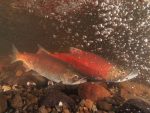Most salmon are bold adventurers. They’re born in freshwater streams and lakes, spend a happy childhood frolicking in those relatively safe waters, and then strike out for the rich, salty waters of the sea where there’s far more food, and also far more predators. Orca and sea lions, to name a few, love to welcome the visitors to their maws.
But there always some who decide to stay at home. These are called kokanee salmon, and they stay in their freshwater homes all of their lives. They tend to be smaller than the relatives who go to sea, and they form their own unique population structures and gradually set themselves apart from others. I’ve always pictured them as the hobbits of the salmonid world, the comfortable homebodies.
There’s a price to pay, though, because their bucolic homes are at risk as humans intrude. Lake Sammamish in Washington state is one of those places where a population of kokanee live. It used to be an idyllic lake, surrounded by forests that sheltered it, but even when I was a kid I heard about the tribulations — the trees were cut down, the lake cabins went up, then the expanding suburbs of Seattle started to encroach. It’s just east of Bellevue and south of Redmond. It became surrounded by parking lots and city streets and office buildings, and the runoff from the regular rains was no longer filtered by the forests, but instead carried a toxic soup of engine oil and lawncare products right into the once-pristine habitat of the kokanee.
And now it’s worse. Five years ago, 18,000 kokanee lived in the lake; now it’s down to…twenty. Not 20,000, just 20. What has killed them?
County biologists are now tasked with studying the unexpected problem to determine what is causing the species to disappear. Parasites, bacteria, and other diseases are suspects. But a likely factor is the increase in high temperatures throughout the year. Recent years have been warmer, with hotter streaks. This warms the water and lowers oxygen levels for the fish.
Now the lesson you might take from this is don’t be a stay-at-home, get out there and explore the world and set broader horizons for yourself. Getting trapped in a single habitat is risky, and all those intrepid wanderers of the salmon world have escaped this peril on the high seas.
I would suggest an alternative interpretation, though. The lakes are warming first, but the oceans are also warming, more slowly and more irreversibly. The anadromous fish have a refuge now, but we humans are coming for them, too, and they’ve only delayed the inevitable. The real lesson is that all populations are vulnerable, that what we think of as a tiny, incremental change, like a few degrees of temperature rise, can lead to catastrophic collapse. They can be resilient and bounce back from some changes, but eventually they can no longer compensate and will fall apart with terrifying swiftness. From 18,000 to 20 within a few years — that’s an apocalypse for one special population of salmon.



Oh, boy, fishery collapse beginning just like the scientists predicted.
The Bay of Bengal’s fisheries are half-collapsed, and the Gulf of Mexico is heading the same direction.
“What has killed them?”…
“County biologists are now tasked with studying the unexpected problem to determine what is causing the species to disappear. Parasites, bacteria, and other diseases are suspects. But a likely factor is the increase in high temperatures throughout the year…”
It’s an unexpected problem? There could be likely factors?
I see that a lot. There must be “suspects”. Something’s got to be responsible for it, right?
There’s one correct answer, and it isn’t ‘unexpected’ nor a mere ‘factor’.
The answer is humans.
to the ignorant it is always unexpected. it is amazing how much of that there is.
uncle frogy
Justified by this matter or not, it is still a good lesson.
When the use of the word “decimate” is downplaying the massive number of deaths, you know things are bad.
It’s like torture deaths in late-15th century Spain.
Trout Unlimited member here. I live in the watershed that Dr. Myers covers here and it’s bad. Salmon/kokanee/trout/steelhead all need cool, clean, oxygenated water and the whole watershed needs drastic work.
A quick review of various salmon or steelhead or kokanee runs will bring tears.
When they are done studying this, they will say “we need cool, clean, oxygenated water and accompanying habitat.” Just like all the other times.